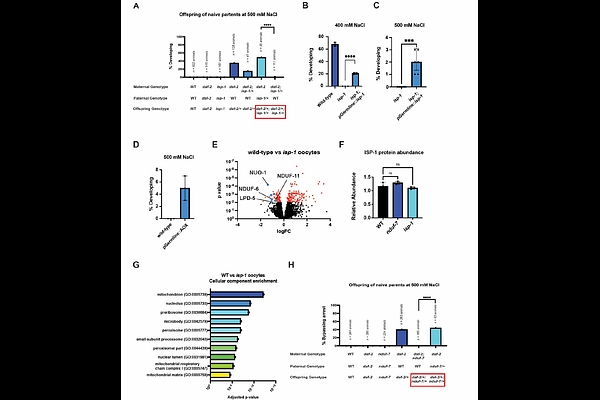Oocyte mitochondria link maternal environment to offspring phenotype

Oocyte mitochondria link maternal environment to offspring phenotype
Cooper, J.; Nguyen, K.; Gates, D.; Wolfrum, E.; Capan, C.; Lee, H.; Williams, D.; Okoye, C.; Nauta, K. M.; Sanchez-Avila, X.; Kelly, R. T.; Sheldon, R.; Wojtovich, A. P.; Burton, N. O.
AbstractDuring oogenesis and maturation oocytes undergo a recently discovered mitochondrial electron transport chain (ETC) remodeling in flies, frogs, and humans. This conserved oocyte ETC remodeling is regulated by maternal insulin signaling, but its role in biology remains unclear. In the model animal Caenorhabditis elegans, we previously found that insulin signaling to oocytes regulates offspring ability to adapt to future osmotic stress by altering offspring metabolism. However, the molecular mechanisms that function in oocytes to mediate this intergenerational stress response are similarly unknown. Here, we developed a low input oocyte proteomics workflow and combined it with our C. elegans intergenerational stress response model to find that both maternal environment and maternal insulin signaling regulate the abundance of ETC proteins in oocytes, particularly the abundance of proteins involved in the transfer of electrons from QH2 to cytochrome C by ETC Complex III. Using genetic perturbations of ETC function we further found that promoting ETC Complex III function in oocytes was both necessary and sufficient to link maternal environment to adaptive changes in offspring metabolism. Lastly, we found that the effects of Complex III dysfunction in oocytes on offspring were mediated via an AMP kinase (AAK-2) dependent mechanism and that AAK-2 functions in offspring to promote ATP preservation and glycerol metabolism in response to stress. Collectively, our data suggest that the role of oocyte ETC remodeling in biology includes linking maternal environments to changes in offspring metabolism that promote offspring survival in the environment experienced by their mother.